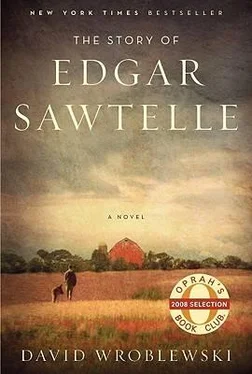And there Trudy found herself unable to look away from all those things she’d worked so hard not to see. When she’d viewed the canvas long enough, so that no part of it remained hidden from her and no part mistaken, the black vine relaxed its grip and time curled up upon its spindles again and rolled forward and Trudy was lying once more on the grass of the yard. Slowly, slowly, her face was turned until the light of the present world shone in the glassy lune of her eye.
And as she watched, flames began to eat through the long, shingled roof of the barn-not the tiny licks of orange that had so horribly filigreed the eaves, but real fire now, living fire that burst forth into the air and disappeared and erupted again as if lunging in desperation to grasp the night and pull it in. A gout of flame flashed high above the barn’s roof, twisting inside a pillar of smoke, a scarlet rose that blossomed and vanished. From inside the mammoth came a low, prolonged groan. The center beam of the roof sagged. Then the wreathing smoke shuddered and retreated into the barn, as if the structure had drawn its maiden breath, and the inferno began. As quickly as that: one moment, a mass of smoke; the next, all was flame. The wakening scorched Trudy’s face. The light it cast painted the fields and woods all around them red.
As heat washed over them, Glen Papineau released Trudy and stood and put his hands in the air and began to slap at his face and chest and hair, throwing a nimbus of quicklime into the air around him.
Am I burning? he cried. Oh God! Have I caught fire?
But Trudy neither moved nor answered. She was not there. She did not know she was unbound. Glen Papineau staggered away, navigating by meridians of heat. Trudy lay on the grass, eyes fixed on the open doors of the barn and the flames that thrust through them like incandescent limbs.
And Glen Papineau plunged across the yard, a blinded bull, stumbling, falling, rising again, bellowing over and over, What’s happened? What’s happened? For God sakes, what’s happened?
The Sawtelle Dogs
THEY HAD MEASURED THEIR LIVES BY PROXIMITY TO THAT silent, inward creature, that dark-haired, sky-eyed boy who smoothed his hands along their flanks and legs and withers and muzzles, a boy they’d watched since the moment of their birth, a boy who appeared each morning carrying water and food and, every afternoon, a brush. Who pronounced names upon them from the leaves of a book. They had taught him while they watched him; they had learned by listening to Almondine. And though they had seldom seen it, they understood the meaning of fire: they looked at the flames soaring into the night sky and the sparks bursting from the timbers, flying upward, ever upward, and the bats flickering into the smoke and curling and plummeting and they knew they had no home.
They circled the fire until their chests belled and their tongues hung loose from their mouths. Embers settled on the pile of papers the boy had made and a few of these began to curl and rise flaming into the air. The flames leapt to the orchard trees by wind and sympathy, until only the house and the young maple and the elderly apple tree whose fingers brushed the house opposed them. Red beams beat across the trees. In the south field, the birches and the white crosses glowed like rubies. The shadows of the dogs, cast from the top of the hill, darkened the forests. Great drabs of tar flew sputtering from the barn roof until the whole structure became transparent, down to the glowing ribs. The wires of the pens pooled like water and boiled away. The fiberglass top of the truck crinkled and smoked and shrank inward, belching a nacreous yellow cloud. The wires strung between the house and barn lay snaked and smoking along the ground. In time, the tires of the truck swelled and burst like gunshots and the truck tipped its lee side toward the flames, lacking the sense to save itself. Far away, on the distant ledge of the world, a thunderhead glowed in response to the fire’s call, but if those clouds came they would offer nothing but an inspection of the bones, charred and smoldering.
The woman lay sprawled on the heat-curled grass between the house and the fire, deaf to their calls, deaf to the cries of the blind man standing over her, ignorant and insensate, as though she had departed her body and left it heaving on the shores of the world. Those who understood saw that the time inside her had been boiled away by the heat of the fire and, if anything, thought she might rise transformed into a swan or a dove.
The heat grew. It drove them first toward the house, then to the garden behind the maple. Fire echoed between the now incandescent orchard and the cracked stone pedestal of the barn. Those dogs were not all equally good; some of them fought and others cowered and still others traced idiotic paths around the spectacle and harassed the blind man as he dragged the woman across the grass. Yet witnesses they were, one and all, trained and bred to watch, taught by their broody mothers to use their eyes, taught by the boy himself to wait for a gesture that put meaning into a world where none existed. Among them, the two pups whimpered and cried and pressed against whoever didn’t snarl. One way or another, all oriented themselves against that hemisphere of fire. Some turned their faces into the night. Some sank to their bellies and rested their jaws on their forefeet, facing into the flames like Sphinxes into the sunset.
Essay ran down into the field then. A few of the other dogs followed, including her littermates and also the two pups, these last, slow and confused. When she reached the rock pile, Essay waited until all had stopped with her, then she circled back toward the yard, snarling at any who tried to follow. They milled and waited. She appeared again with half a dozen more dogs following, the rest unwilling to leave the aureole of heat. She trotted through the pack and along the edge of the field, her back reddened by the blaze. When they reached the old logging road, she passed the birches without hesitation and departed the field near the southwest corner, cutting crosswise through the forest. In the woods, they slowed their pace. The dogs spread out beside and behind her.
They passed through fence after fence. Some of the dogs fell away, lost or disheartened, but she did not stop or circle back. They would follow or they would not, she had only made the possibility clear. Night birds decried their passage. A ménage of deer sprang from their bedding grounds. She led the dogs along, checking her way, though it had been marked so obviously that some ran ahead. And then, realizing she’d lost the pups, she did stop and backtrack. She found them huddled near a fallen tree, whimpering and shaking in the moonlight. She lowered her muzzle and they licked at her face and swatted their tails through the bracken, and in return she mouthed their necks and nosed along their sides and feet and bellies, then turned and trotted away. So coaxed, they began to follow again.
The forest streamed round. The night passed. They tracked through marshes and forded creeks until the dark vault overhead gave way to a deep orange, the sky ignited by what they’d left behind. Presently, Essay emerged from the woods. Before her, a field sloped away, fallow for many seasons and dotted with scrub pine. The grass bent wet and heavy in the still morning. From behind her came the hoarse cry of the diaspora, bursting through the underbrush. When the sun broke over the treetops, all before her glittered.
To the west, across the field, Forte paced the tree line, his figure cutting back and forth on the thin fog that clung to the ground. To the east, where the field bottomed out, a scattering of lights twinkled among the trees and here and there the slanted rooftop of a house was visible. Essay could hear the earth breathing around her. If not for the white steeple that rose over the treetops and the headlights that flickered into view on a blacktop far away, she might have been looking on a scene from the beginning of the world. A thing like a song or a poem rang in her ears. There was Forte. There was the village. One by one, the Sawtelle dogs trotted from between the trunks of the trees and followed the forest’s edge until they all stood together, Finch and Opal and Umbra and Pout and the two unnamed pups and all the others who had followed through the night. They traced Essay’s gaze across the field, first east, then west, and shuffled about her and licked her muzzle, making their desires known, and then they waited.
Читать дальше
Конец ознакомительного отрывка
Купить книгу












